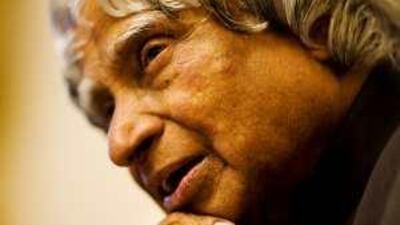ABU DHABI // A good working relationship between India and the UAE would benefit not only both countries but also the world at large, APJ Abdul Kalam, the former Indian president, said yesterday. From the energy sector to date farming, Mr Kalam said, collaboration would create a "win-win situation".
Mr Kalam, 77, was in the capital this week as one of the keynote speakers for Education Without Borders, a biennial student conference which aims to foster educational opportunities for young people around the world. He said because the UAE was India's third largest trading partner, and that the countries were located near each other and shared cultural values, that they were in a good position to work together.
"They can work together in the energy sector, particularly to generate clean energy," he said. "It could be solar energy or emulsification of diesel which will lead to clean energy. Also, both our countries can develop low-cost desalination plants using solar energy. "This will create a world knowledge platform because, from the core competence of two nations that have been brought together to jointly develop technology, the world will ultimately benefit."
Farming is another area in which Mr Kalam would like to see more collaboration, especially in connection with dates - from cultivation through product manufacturing to marketing. He believes the UAE has the best dates in the world. "They taste like honey," he said. While India produces its own dates, he said, "the quality is not good". But India has land to spare and technology that would enable an evolution of new farming techniques to the benefit of both countries.
Before he served as president of India, from 2002 to 2007, Mr Kalam was a scientist and engineer with the Indian Space Research Organisation and the Defence Research and Development Organisation. He also acted as an adviser to the Indian government on its nuclear tests in 1998. "Whatever we do as nations, if we work together, it will always be a win-win situation," he said. "And any work we do will build goodwill between the citizens of both countries. And the benefit will be beyond our shores."
Taking a page from his autobiography, Wings of Fire, in which Mr Kalam wrote at length about the influence his mother and teachers had on his childhood, he recently toured the UAE talking to students, including at the Dubai Women's College and the Abu Dhabi Indian School. He stressed to them the importance of education and the bond between teacher and student. However, when asked about the pressures on today's Indian students to excel versus a general quest for knowledge, Mr Kalam said: "It's the parents. They decide what the child will study. The children are innocent in this."
He added: "During my lectures, I told students that they should care about three things when it came to knowledge. It should be about creativity, righteousness of the heart - which is the value system - and courage, and it is the teacher's responsibility to impart this." Empowering the next generation through education is a theme of another of Mr Kalam's books, titled India 2020: A Vision for the New Millennium, which he wrote before becoming president. The book was inspired by a conversation with a girl who, when asked by him what she dreamt of, told him she wanted to live in a "developed India".
The book also looks at the rise of regionalism, which Mr Kalam believes will lead to prosperity and peace. "Imagine a nation. They may have prosperity but not peace. Now imagine five nations, then an entire continent working together. They come together to decide the peace of the region. They target poverty, they create new markets between themselves. This is why regionalism is much better than a single nation dictating to the others."
@Email:sbhattacharya@thenational.ae

